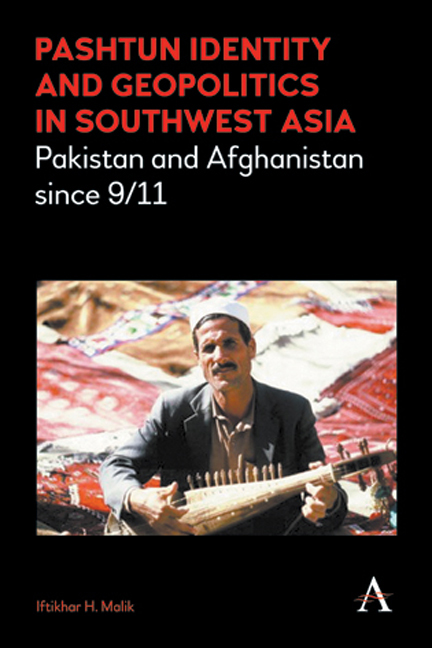Book contents
- Frontmatter
- Contents
- Preface
- Acronyms
- Glossary
- Maps
- Introduction
- Chapter One Gandhara Lands: Wrestling with Pashtun Identity and History
- Chapter Two Imperial Hubris: The Afghan Taliban in Ascendance
- Chapter Three Masculinities in Conflict: Western Pedagogy and the Return of the Afghan Taliban
- Chapter Four Understanding Pakistan: Geopolitical Legacies and Perspectives on Violence
- Chapter Five Understanding Civic Sentiments and Movements in Pakistan: Stalemated Cycle, or a Way Forward?
- Chapter Six The United States and Pakistan: Friends or Foes!
- Chapter Seven The European Union and Southwest Asia: Perceptions, Policies and Permutations
- Conclusion: Pashtun Troubled Lands, Uncertain Southwest Asia or a New Beginning!
- Notes
- Bibliography
- Index
- Frontmatter
- Contents
- Preface
- Acronyms
- Glossary
- Maps
- Introduction
- Chapter One Gandhara Lands: Wrestling with Pashtun Identity and History
- Chapter Two Imperial Hubris: The Afghan Taliban in Ascendance
- Chapter Three Masculinities in Conflict: Western Pedagogy and the Return of the Afghan Taliban
- Chapter Four Understanding Pakistan: Geopolitical Legacies and Perspectives on Violence
- Chapter Five Understanding Civic Sentiments and Movements in Pakistan: Stalemated Cycle, or a Way Forward?
- Chapter Six The United States and Pakistan: Friends or Foes!
- Chapter Seven The European Union and Southwest Asia: Perceptions, Policies and Permutations
- Conclusion: Pashtun Troubled Lands, Uncertain Southwest Asia or a New Beginning!
- Notes
- Bibliography
- Index
Summary
Momentous and painful developments in both Afghanistan and Pakistan, and especially in their Pashtun regions, over the past two decades make it pertinent to analyse their respective and often conflictive quest for a consensus-based identity within the parameters of ethnic and religious pluralism. While the Pashtuns on both sides of the Durand Line – seen through the Orientalist or neo-Orientalist prisms – have been in the throes of these vital historical, ideological and geopolitical events, studies have often tended to focus only on the high politics of the two Southwest Asian states, the North Atlantic Treaty Organization (NATO) and the Afghan Taliban. Other than a pronounced and no less grievous reality of various forms of violence, these countries and especially their Pashtun regions are hastily caricatured as the epicentre of world terror and an exclusive and inherently militant political Islam. In the process, the securitization of scholarly investigation ends up overshadowing the historical and sociological aspects of life in the Gandhara lands, or upper Indus Valley. Ironically, it may appear convenient to hastily lump a historical (Gandhara) region like Southwest Asia – or western territories of the Indus Valley – only as an area of perpetual conflicts, porous borders, volatile ethnicity and a militant Islamism, and even its reconstruction as the romanticized graveyard of the old and new empires is not too unfamiliar. These factors may operate as significant determinants, but one needs to go beyond them. While recapping history, sociological hypotheses and security analysis, this volume seeks out more recent and ongoing thematic issues such as state formation, civil society clusters, multiple forms and postulations of violence and postulations from the outside. Southwest Asia, especially after the Western invasion of 2001, has encapsulated varying but no less problematic relations with NATO, the European Union (EU) and regional neighbours, along with intermittent tensions between Kabul and Islamabad, further complicated and influenced by ground realities, grass-roots defiance and various forms of competitive modernist and traditional trajectories.
Whereas since the withdrawal of most NATO and International Security Assistance Force (ISAF) troops from Afghanistan in 2014 politicians and strategists have talked of ‘minimal deterrence’ and ‘zero option’, Afghans and Pakistanis are faced with fresher challenges and opportunities with varying regional and global ramifications.
- Type
- Chapter
- Information
- Pashtun Identity and Geopolitics in Southwest Asia , pp. viii - xiPublisher: Anthem PressPrint publication year: 2016



